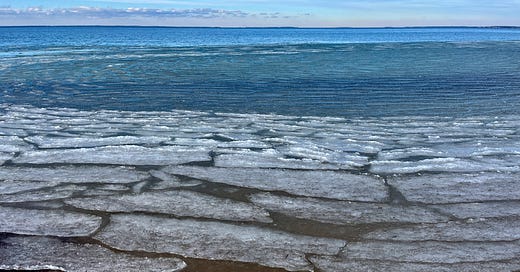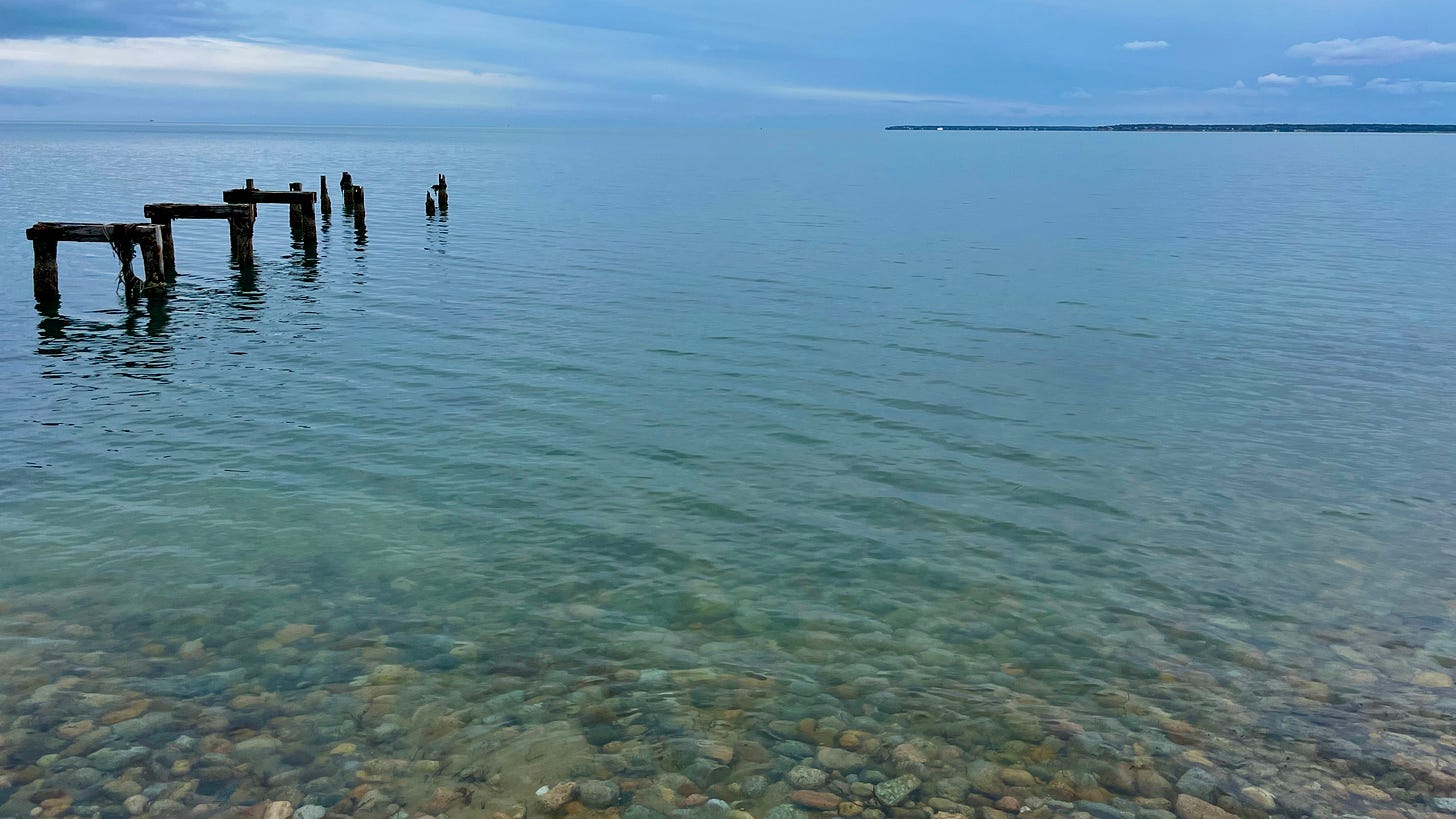For a while it seems that winter will never come.
We have week after week of sun, so much there is a rare fire risk. I meet friends to float in the sea well into November, the water clear, the air warm. No gear besides swimsuits. No punishment for submerging. It is our consolation as the election results sink in. Time seems to pause somewhere golden.
I am taking a pottery class on weeknights, now that it is dark after dinner. Meeting friends at the brewery on Friday nights, to shake off the workweek and tire out our dogs. Stocking the freezer with soup. Reading book after book of Irish fiction. Then comes December, with travel and the holidays. In January I realize how cold it has become.
Wintering—in the
sense, as a season of life—still takes me by surprise. I think that with foresight I can stop it. That soup and clay can protect me. That I can trick my nervous system with exercise and vitamins. If I train hard enough, I can jump right over it. But winter has settled in, anyways.I try to fit a narrative around it. This is a dark time of year and I miss the sun. This is the season in which I’ve lost loved ones and when we first blundered our way into pandemic isolation. My body must remember. And, of course, this is a time without shelter from aggressive political upheaval.
I return to the water, exposing my body to lower temperatures than any winter before.
The Vineyard Sound has hovered at 33°F (0.5°C) for the last month. The salt ponds and marshes have been icy since Christmas, occasionally firm enough for skating. Sheltered beaches have a skirt of ice at the water’s edge. On particularly cold days the ice stretches into the water, soft circles with edges of slush, newborn pancake ice, something I’ve only seen otherwise in photos from the Arctic. I’ve abandoned my wetsuit, my hood, and long swims with my head underwater. But I’m wading in, more and more often, to float in the oblivion of cold.
I plunge with other women. We talk on shore as we peel off our layers. Someone suggests a primal scream as we enter the water. More often, we involuntarily giggle as we pick our way in, trying not to turn our ankles on the shifting rocks that pave our most frequent entry point.
Those first steps into the water are easy, with my feet snug in thermal booties. It’s at mid-calf that I feel a burn, at my waist that I let out a whoop and raise my hands over my head, unwilling to dip my elbows quite yet. I sink to my shoulders, relax my arms into the water, and a heady, dizzy nausea floods over me. A few deep breaths later and warmth floods my body.
I try to make a rule, for myself at least, not to allow current events to ruin our time in the ocean. I try not to talk about them while we’re in. I apologize for any slips, then look out at the horizon, watch cormorants fishing, consider the hue of the sky, and tip my head back to feel the sun. I don’t have to try to be grateful, when we are floating here. Someone always says it, once the first shock subsides, like we’re in some euphoric trance: “We are so lucky to do this.”
I reread Wintering, several weeks ago, a little slice at a time before bed.
I have read it more than once every year since its publication. It’s a book that follows the author’s health crisis, drawing back from work, entering a season where she cannot produce in the ways that society expects. It continues as a meditation on winter as a normal part of the human experience and investigates what the season looks like in other cultures and in nature.
I’ve always read it for myself. It gives me permission to rest, to not fight the fallow seasons or freight them with shame. After a few pages, a physical sensation of relief floods my body. I feel safe and reassured. Ready to turn out the lights and drift into deep sleep.
This winter, the book seems more timely than before, not as a tonic for my personal nervous system, but as an argument for how we should structure society. All humans enter seasons when we need extra care and protection. On this read, I feel trapped in a country that is determined to destroy our protections against winter.
When I leave my office for a plunge this week, I realize I packed everything but a suit.
I have two of everything else—booties, mittens, towels, hats. I sort through my bag over and over. But I know I didn’t pack one. I remember gathering my things in our basement that morning and I didn’t take one off the line. I can still walk down to the water and be in the company of my friends. But I am desperate for the rest of the ritual, the cold compression of the water, the way it forces me to breathe deeply.
After a few frantic texts, a friend says she has a suit that I can borrow. Minutes later I am on the shore with the others, gingerly working my way into the sound, and trying not to slip.
When the sea is near freezing we only stay in a couple minutes. My sense of warmth shifts to numbness. Then it’s as if my flesh has vanished. I could bang my femurs together, bone on bone. When I move I feel only a distant sensation of my muscles crinkling, like I’ve interrupted them from becoming ice.
As we begin our return to shore, I notice the water is tinted green. I suspect the color means that microscopic life is already responding to longer days. I turn to a friend who studies plankton, and ask. “Is it spring bloom already?” And it is.
On the shore, skin orange-red, the cold cannot touch me. I dry off, wrap up, dress in warm clothing under my robe. My friends and I thank each other profusely for meeting, and then we go back to our days. Plunging is not our act of avoidance, but of gathering strength.






Just BEAUTIFUL- you have captured so many emotions and found the fit of perfect wording to connect to everyone feeling the same exact way!
Love this one especially much for some reason